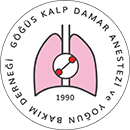

Anesthetic Management in a Neonate Undergoing Percutaneous Balloon Pulmonary Valvuloplasty: A Case Report
Melike Korkmaz Toker1, Çiğdem Sezgin21Department of Anesthesiology and Reanimation, Muğla Sıtkı Koçman University Faculty of Medicine, Muğla, Türkiye2Department of Anesthesiology and Reanimation, Muğla Training and Research Hospital, Muğla, Türkiye
Critical pulmonary stenosis (CPS) is a life-threatening congenital heart defect in neonates, requiring prompt intervention. Percutaneous balloon pulmonary valvuloplasty (BPV) has emerged as the treatment of choice, but perioperative anesthetic management remains complex. We report the anesthetic management of a 17-day-old, 3020 g neonate with CPS, a secundum atrial septal defect, and a small ventricular septal defect. Anesthesia was induced with midazolam, fentanyl, and rocuronium, and maintained with continuous midazolam and fentanyl infusion. Normocapnia and moderate FiO₂ were ensured. The patient remained hemodynamically stable throughout the procedure, and BPV was successfully performed without complications. The postoperative course was uneventful. This case illustrates the importance of individualized anesthetic strategies in neonates with CPS. A balanced opioid-based approach, combined with careful respiratory and hemodynamic control, contributed to a safe perioperative course. Recent literature emphasizes the growing safety of BPV when accompanied by vigilant anesthetic care.
Keywords: Anesthesia, balloon pulmonary valvuloplasty, congenital heart disease, neonate, pulmonary stenosisMakale Dili: İngilizce

















